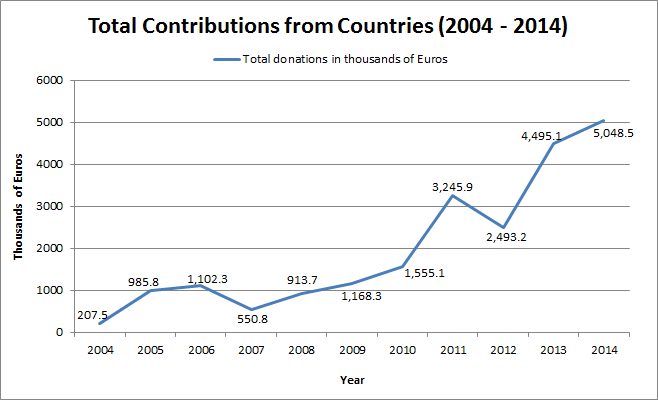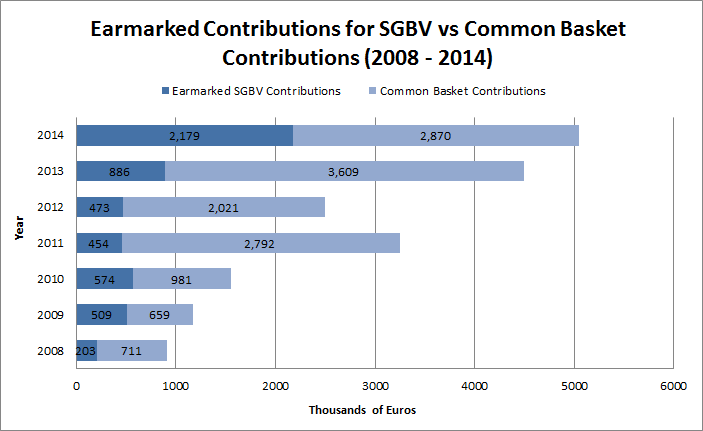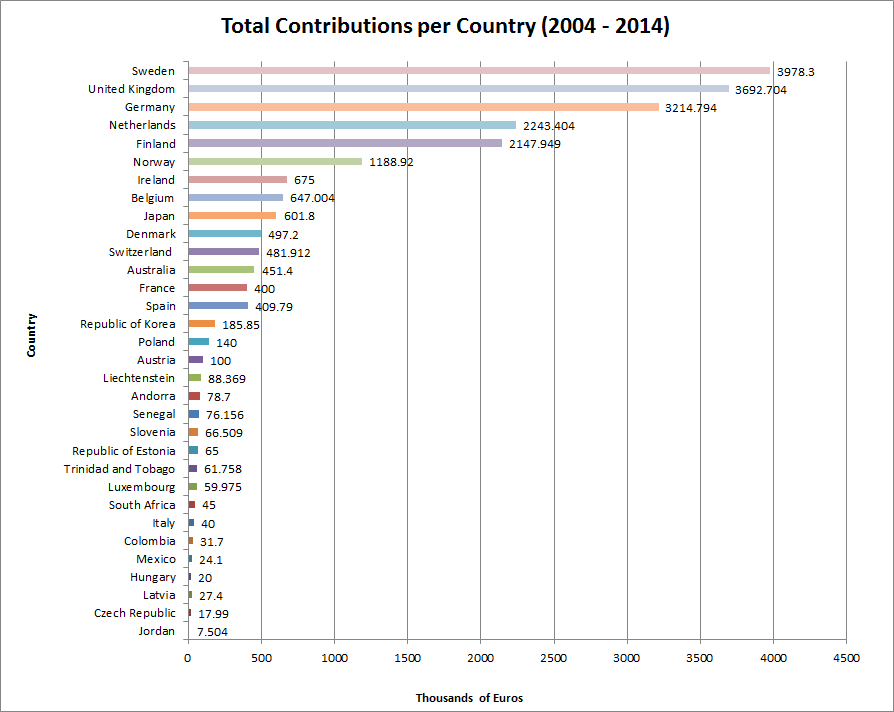Financial information
The success and credibility of the TFV to ensure that the rights of individuals are fulfilled, and that survivors of the gravest human rights violations are empowered to live a life of hope, dignity and respect, strongly depends on its ability to develop and maintain its resource base, which is nurtured independently from the Court’s regular budget.
The TFV raises funds to help deliver its vision, mission and strategic goals, with the specific aim to raise unrestricted and flexible income to fund innovative assistance and reparations programming and advocacy. The TFV strives to be a partner of choice by cultivating ambitious and pioneering partnerships with private and government donors. The TFV endeavours to inspire current and potential supporters with engaging communications efforts, and programme impact and success.
For the TFV to achieve financial growth and sustainability, the Strategic Plan 2014-2017 sets out the following goal:
Public and private donors, as well as court-ordered fines and forfeitures, provide the TFV with sufficient resources to operate its assistance and reparations programmes in ICC situations.
Since 2004 to October 2014, the accumulated total of contributions from countries has amounted to over €20.4 million euros. In 2014 alone, the total amount of contributions from countries was over €5 million euros.

Common Basket Approach
Unrestricted funds provided to the TFV are considered common pooled funds, or common basket funding (resources from a number of donors pooled using one agreed set of procedures and reporting), in support of a specific set of activities potentially under both the assistance and reparations mandates. The TFV takes responsibility for coordinating and managing the pooled funds from the various donors; and funds are released by the TFV according to the need of victimized communities, an agreed granting strategy, and selection criteria.
The TFV will maintain a sector approach as a way of working with local partners, donors and other stakeholders. It ensures local ownership of the support provided, and all projects are aligned with national development policies and frameworks as part of the Trust Fund for Victims performance monitoring plan.
Restricted Funding
Grants or donations that require that the funds be used in a specific way or for a specific purpose are also managed by the TFV as earmarked contributions. Restricted funding is often accompanied with an agreement between the donating party and the TFV and ICC.
Examples of earmarked funding have included support for victims of sexual and gender-based violence (SGBV), funding for reparations, and support for former child-soldiers. Due to the complexities involved with managing earmarked resources, the TFV ensures that the acceptance of earmarked contribution is in accordance with the conditions set out in TFV Regulations 27-30, unless they are recovered assets for the purposes of fulfilling Court-ordered reparations.
In the year 2014 alone, €2,178,600 euros has been made available for SGBV programmes under the TFV assistance mandate in the Democratic Republic of Congo, northern Uganda and the Central African Republic. This fund has been significantly increased thanks to the generous donations from Japan and the United Kingdom.

Reparations reserve
The TFV reparations reserve may be used to complement Court-ordered awards in the event that a convicted person is declared indigent. Currently this is held at a level of € 3.6 million.
This figure includes allocations made by the TFV Board of Directors from the common basket as well as voluntary contributions earmarked specifically to the reparations reserve. The following contributions earmarked for reparations have been received:
- Germany (2013) - €900,000
- Finland (2013) - €107,000. In accordance with the donor agreement, this amount was transferred to the TFV’s common basket after it could not be spent in the 2013 calendar year, in the absence of Court-ordered reparations decisions.
Private contributions
During 2010-2014, the TFV has received close to € 80,000 in private donations.
While the majority of funding to the TFV will continue to flow from States Parties, achieving a more solid private donor base will serve a dual purpose: next to boosting the Fund’s reserve, to demonstrate that the Trust Fund’s value proposition of reparative (and transformative) justice resonates well beyond governments into the public domain. This will help to strengthen the TFV’s profile and public support. Engaging with both public and private donors is a mutually reinforcing fundraising strategy.
Costs of the Board of Directors and the Secretariat of the Trust Fund for Victims
According to Regulation 16 of the Regulations of the Trust Fund for Victims, the members of the Board of Directors “shall act in their personal capacity on a pro bono basis”.
In 2004, the Assembly of States Parties established the Secretariat of the TFV, which is funded from the Court's budget. The Secretariat currently employs eight full-time staff and has an approved budget of € 1.93 million for the year 2015.

Donor Countries (as of 2014):
To date, voluntary contributions by States Parties have been the TFV’s main source of income, and thus the TFV would like to thank the following countries for their donations:
- Andorra
- Australia
- Austria
- Belgium
- Colombia
- Czech Republic
- Denmark
- Estonia
- Finland
- France
- Germany
- Hungary
- Ireland
- Japan
- Latvia
- Liechtenstein
- Mexico
- Netherlands
- Norway
- Poland
- Republic of Korea
- Senegal
- Slovenia
- South Africa
- Spain
- Sweden
- Switzerland
- Trinidad and Tobago
- United Kingdom
